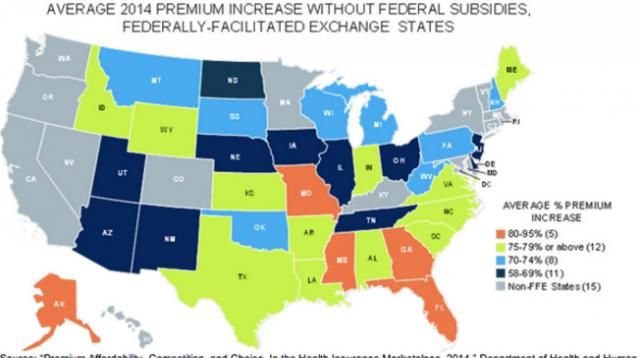Obamacare subsidy rulings put heat on governors
Eliot Cutler, independent candidate for Maine governor, called a news conference last week to decry the ruling by a federal appellate court that could lead to the elimination of premium subsidies for Obamacare enrollees in Maine and 35 other states relying on the federal insurance exchange.
“Had there been a state exchange designed specifically for Maine … families across the state of Maine would not be wondering when they go to sleep tonight if and when they will lose their health insurance,” Cutler said.
So far Cutler, who trails Republican Gov. Paul LePage, a hard-line Obamacare foe, and Democratic nominee U.S. Rep. Mike Michaud in the polls, is one of the first political candidates across the country to use the court decision to fire up support among voters who benefit from the healthcare reform law's subsidies. But some experts say other political candidates may follow as they and voters have time to assess the ruling.
The ramifications of last week's 2-1 ruling by the U.S. Circuit Court of Appeals for the District of Columbia in Halbig v. Burwell, which disallowed premium subsidies in states using the federal exchange, are potentially immense. If that opinion is ultimately upheld by the U.S. Supreme Court and enrollees in those states are denied subsidies, more than 7 million Americans would lose some $36 billion in premium assistance in 2016, according to the Urban Institute. It's expected that many if not most would drop their coverage.
Those people would be disproportionately in Republican-led states, some of which saw big enrollment on the federal exchange.
“It becomes health reform for blue states,” said John Holahan, an author of the Urban Institute report. “In the rest of the country you don't have health reform.”
Republicans could face a backlash if their constituents realize they could lose benefits due to a lawsuit broadly backed by GOP politicians. That could be problematic for Republican governors facing tough re-election contests in states such as Florida, Georgia, Maine, Pennsylvania and Wisconsin. Those governors already are under pressure from hospitals and other business groups to expand Medicaid to lower-income adults as allowed under the Patient Protection and Affordable Care Act.
“If the end result is if you live in New York you get (subsidies) and if you live in Georgia you don't, I don't think that's politically palatable,” said Kevin Wagner, a political science associate professor at Florida Atlantic University. “You start hitting middle-class people, and they vote.”
In Florida, Democratic gubernatorial candidate and former Gov. Charlie Crist quickly used the Halbig ruling to attack Republican Gov. Rick Scott. Florida had among the highest rates of exchange enrollment in the country, with roughly 1 million sign-ups by mid-April. More than 90% of Florida exchange enrollees qualified for premium subsidies that on average covered 80% of their monthly premiums. “Rick Scott's refusal to bring Republicans and Democrats together on affordable healthcare now means that 1 million middle-class Floridians may find their affordable health insurance far more expensive,” the Wall Street Journal quoted a Crist campaign spokesman saying last week.
In Pennsylvania—where Republican Gov. Tom Corbett, a strong Obamacare opponent—is behind in the polls, healthcare has been pushed to the background behind education funding and the economy as the top two issues, said Terry Madonna, a pollster and political science professor at Franklin & Marshall College, Lancaster, Pa.
But there is the potential for Democratic candidate Tom Wolf—who has promised to take aggressive action to expand access to healthcare—to exploit the legal threat to the subsidies. It could be a potent issue given that 318,000 Pennsylvanians signed up for coverage through the federal exchange and about 81% receive premium subsidies.
Democratic governors in states that did not establish a state-run exchange—such as Illinois Gov. Pat Quinn, who is facing a tough re-election contest—also could face pressure to take action. Democratic state Rep. Robyn Gabel said she may push a bill to establish a state-run exchange when the Illinois Legislature reconvenes in November. “Having the subsidies only be available to people who enroll in a state exchange is a very compelling reason to pass this bill,” Gabel said.
Some analysts argue that governors, if they want to, could find an easy legal workaround to establish a state-run exchange that would comply with the Halbig ruling. Nicholas Bagley, an assistant professor of law at the University of Michigan, wrote that a state could “establish an exchange and appoint a state-incorporated entity to oversee and manage it. That state-incorporated entity could then contract with HealthCare.gov to operate the exchange.”
Attorney Mark Rust, chair of Barnes & Thornburg's healthcare practice in Chicago, said the seven states such as Illinois with so-called partnership exchanges—which rely on HealthCare.gov for enrollments but fulfill other duties such as plan management—already may meet the standard for having a state-based exchange. Other states could fairly easily convert to this hybrid model, he added.
Wagner said the political dynamics of healthcare reform have changed since 2010, when Republicans wrested control of 11 governorships from Democrats. “It's not an abstraction anymore. There are millions of people signed up,” he said. “Historically we don't take (benefits) away, and (politicians) who try to tend to be finding another job.”





 Maybe it will protect us from being too thin-skinned (too compassionate, or something).
Maybe it will protect us from being too thin-skinned (too compassionate, or something).